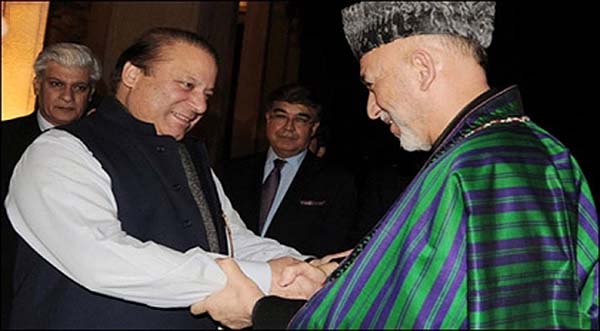Pakistan’s Prime Minister Nawaz Sharif is set to visit Kabul on Saturday and discuss Afghan peace talks with President Hamid Karzai. The meeting between the two leaders would mark the latest of a series of efforts by Afghan and Pakistani leaders to kick-start peace with the insurgent groups. The last time the two officials discussed bilateral relations and peace talks with the militants was in London trilateral summit hosted by British Prime Minister David Cameron.
According to the reports, the Afghan and Pakistani leaders will discuss a range of bilateral issues including security, trade, border security and peace talks with the insurgent groups. However, their meeting would mainly focus on exploring ways to initiate negotiations with the Taliban and bring the Afghan Taliban back to negotiation table. Despite the relatively low profile of the visit, Afghan and Pakistani leaders seem eager to continue talks until finding a common ground over the Afghan peace talks that could result to taking concrete measures by Islamabad in support of Afghanistan’s peace.
Nawaz Sharif’s trip to Kabul takes place after a recent visit of an Afghan High Peace Council (HPC) delegation from Islamabad with the aim to meet Taliban senior figure, Mullah Abdul Ghani Baradar who Pakistan says has been freed from prison. However, Kabul – and the Taliban – maintains Mullah Baradar is not free and has been put under surveillance of Pakistan’s intelligence agency. A main demand of Afghanistan from Pakistan’s government after the reported release of Mullah Baradar has been to facilitate meetings between Afghan negotiators and the Taliban once second-in-command.
It is not clear whether the Afghan High Peace Council delegation has managed to visit Baradar and if Pakistan has provided any sort of cooperation with the Afghan delegation to talk with the Taliban senior figures particularly Mullah Baradar. Previously, the release of Mullah Baradar was on top of the list of Afghanistan’s demands and President Karzai was specifically vocal on asking Islamabad to arrange talks between him and Afghan diplomats.
The secrecy surrounded with the latest visit of the High Peace Council negotiators suggest that there may have been some progresses and the Pakistani government may have arranged a closely-controlled meeting between Baradar and Afghan peace negotiators. There have been no official comments by Afghan and Pakistani officials if there were any contacts between the Afghan HPC delegation and the top militant leader during the visit of the Afghan delegation to Pakistan. However, there are unconfirmed reports that secret meeting/s had taken place with coordination of the Pakistani government. If such a meeting has been arranged by Pakistan’s help, it would mean that the country has already started a role in the Afghan peace process that has long been asked by the Afghan government.
Another sign that the Afghan and Pakistani cooperation is progressing is that more recently the Afghan government has been less critical to Pakistan and its role in the Afghan peace efforts. Afghan officials have expressed optimisms over Nawaz Sharif’s Afghan policies saying that he has good intentions regarding peace in Afghanistan. In his turn, Sharif has sought to ease tensions between Afghanistan and Pakistan and has ostensibly backed a policy of confidence-building with Afghanistan that could pave the way for a greater role in supporting the peace process.
Still, the Pakistani leader has been unable to take concrete measures in support of the Afghan-led peace initiative and meeting the demands of the Afghan government. This is perhaps due to Pakistan’s internal politics and the dominant role of the country’s security and intelligences institutions. And again, this explains why Sharif has chosen a slow-paced and cautious approach towards the Afghan peace process.
Pakistan’s domestic problem with the Taliban is going to play an important role in the country’s role in the Afghan peace process. Pakistan attempted peace negations with the Tehrik-e Taliban Pakistan which failed with the death of the TTP leader Hakimullah Mehsud by a CIA aerial attack. At the aftermath of the killing, the Taliban chose a more hard-line figure as their new leader which meant an end to any negotiation attempt by the government of Pakistan. The latest developments lined both the Afghan and Pakistani Taliban under Mullah Omar’s leadership as Omar’s role was visible in choosing the new TTP leader.
The ever-closest relations between the Afghan and Pakistani Taliban is considerably troublesome for Pakistan. Islamabad may soon see no option but to confront both the Afghan and Pakistani Taliban on its soil. This somehow explains why Pakistan has chosen to start supporting the Afghan peace efforts as it finds it difficult to continue differentiating between good and bad Taliban. Pakistan knows well that it has a lot to lose after the NATO withdrawal from Afghanistan given the more radicalization of the extremist groups on both sides of the Durand Line.
Security-related negotiations between Afghan and Pakistani leaders are moving to another phase while Pakistan saw a transfer of military leadership from Gen. Kayani to Gen. Raheel Sharif. Sharif is considered a moderate officer who has played a remarkable role in Pakistani military’s strategic assessment of long-term threats posed to the country, based on which the Taliban poses a threat to Pakistan’s security as equal as India. With the new military leadership in Pakistan, it is expected that military policy aligns more with the civilian policy particularly regarding the Afghan peace process and the ongoing fight against the insurgent groups. The more conformation of Pakistan’s civil and military policies after the recent transfer of military leadership in Pakistan would further strengthen Nawaz Sharif’s bid for having a better relations with neighbors and to help bringing peace in Afghanistan.

